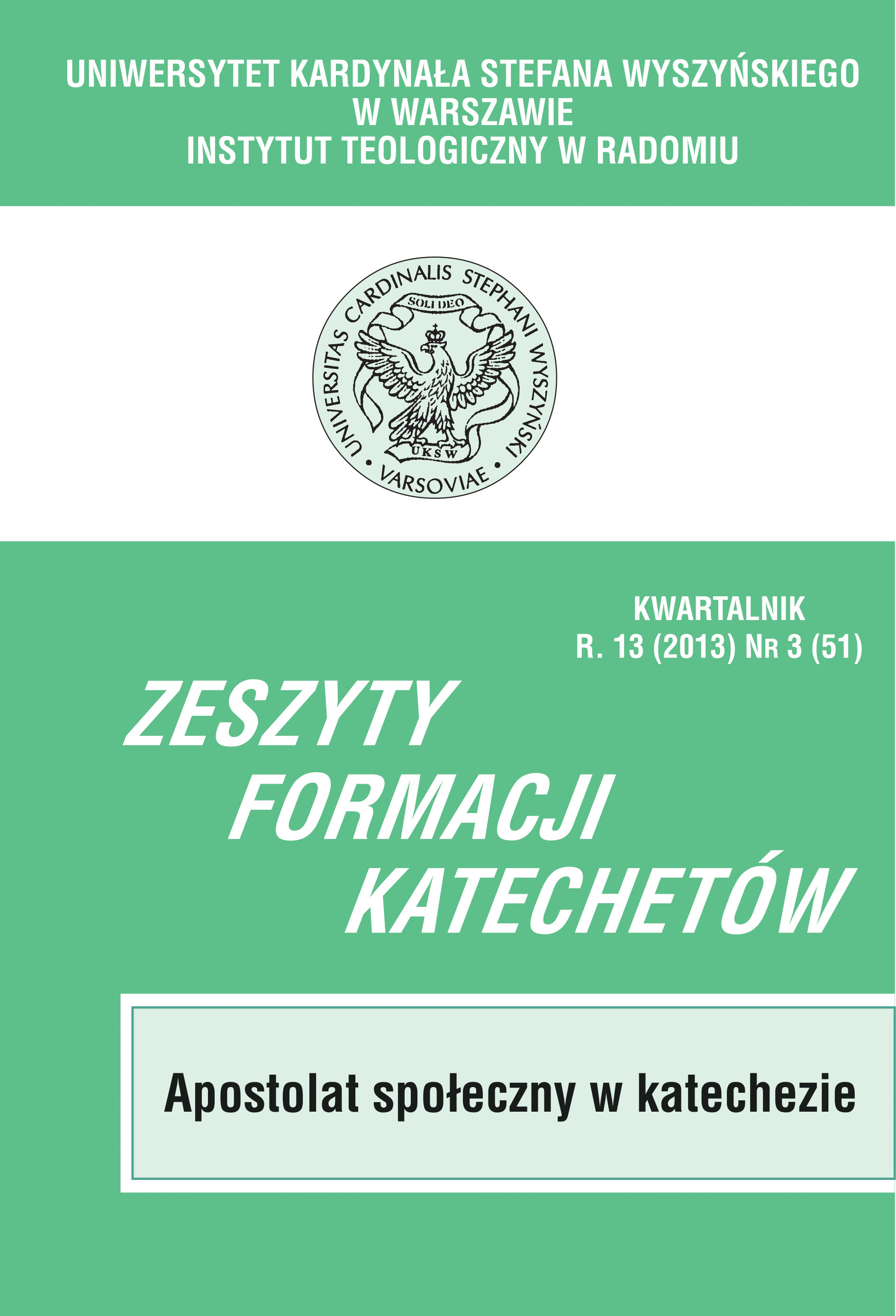Formation of children and young people to the social apostolate
Keywords:
children, youth, social apostolateAbstract
The social nature of man and the Christian vocation to holiness requires apostolic commitment in various areas of social life. The essence of the social apostolate Catholics saturation all areas of the temporal spirit and Christian values, with his competence and on their own responsibility, guided by the light of the Gospel and Christian love. Teaching of the Catholic Church today shows the following fields renewal of the temporal order: family, culture and mass media, social and economic life and ecology, politics and concern for peace building in the world. Lay Catholic Church calls for coherence religious and social life. Difficult task of renewal of the world demands a pro-social formation of the laity and this should begin as early as the early childhood and change over time in adult ongoing formation of the faithful. The purpose of the apostolic formation of lay Catholics is to discover their mission in the Church and in the world and to prepare for its implementation. Apostolic formation should lead to the formation of the lay faithful in their mature personality, faith -based ties with persons of the Trinity, and a sense of responsibility for the salvation of their own and other people. Formation can not be limited to acquire a thorough knowledge of the modern world, but should aim to form an in Catholics skills of fraternity and cooperation, and establish a dialogue. In the formation of the apostolic idea is to convince students that the entire Christian life has a social dimension, and this according to the will of Christ should be formed on the foundation of the gospel.
References
Baczyński A., Mass media, w: Leksykon teologii pastoralnej, red. R. Kamiński, W. Przygoda, M. Fiałkowski, Lublin 2006.
Benedykt XVI, Dobro i społeczeństwo nie mogą przetrwać bez wolontariatu, Wiedeń 9 IX 2007, „L’Ossevatore Romano” (wyd. polskie) 28(2007) nr 10-11.
Chlewiński Z., Formacja, EK t. 5, kol. 389.
Fiałkowski M., Obecność Kościoła w życiu gospodarczym, „Roczniki Teologiczne” 53 (2006) z. 6.
Fiałkowski M., Życie społeczno-polityczne miejscem zaangażowania katolików świeckich, „Roczniki Teologiczne” 55 (2008) z. 6.
Jan Paweł II, Miłość najwspanialszą formą ewangelizacji. Przesłanie na zakończenie Międzynarodowego Roku Wolontariatu, Watykan 5 XII 2001, w: http//www.opoka.org.pl./biblioteka/W/WP/jan_pawel_ii/ przemówienia/ wolontariat_05122001.html [2011.06.01].
Kongregacja Nauki Wiary, Nota doktrynalna o niektórych aspektach działalności i postępowania katolików w życiu politycznym, 24 XI 2002, nr 3.
Papież Franciszek, Homilia podczas Mszy świętej w Domu św. Marty, 24 IV 2013, w: http://pl.radio-vaticana. va/magazyn.asp [2013.05.06].
Przygoda W., Apostolat społeczny, w: Leksykon teologii pastoralnej, red. R. Kamiński, W. Przygoda, M. Fiałkowski, Lublin 2006.
Sobolewski Z., Caritas: Chcemy być „solą ziemi”, w: Komisja Duszpasterstwa KEP, Program duszpasterski na rok 2012/2013 „Być solą ziemi”, Poznań 2012.
Downloads
Published
How to Cite
Issue
Section
License
Copyright (c) 2013 KATECHISTS' PERIODICAL

This work is licensed under a Creative Commons Attribution-NonCommercial-NoDerivatives 4.0 International License.

